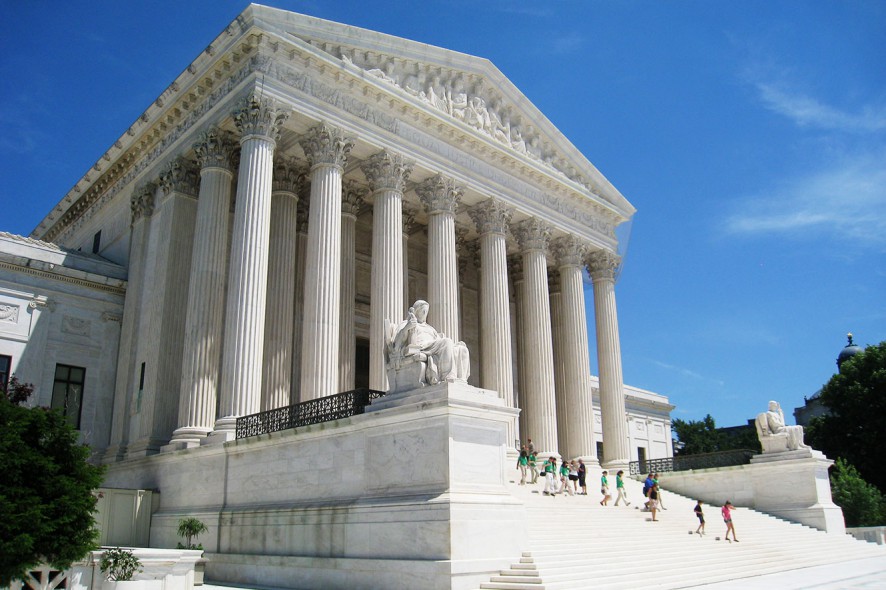Supreme Court of the United States (SCOTUS): While deliberating upon the applications seeking relief from an Executive Order issued by the Governor of New York imposing very severe restrictions on attendance at religious services in areas classified as “Red” or “Orange” Covid-19 zones; the Full Bench of the Court, with a ratio of 5:4, barred the restrictions on religious services in New York that Governor Andrew M. Cuomo had imposed to combat the coronavirus. The majority comprising of recently inducted Justice Amy Coney Barret along with Samuel Alito, Brett Kavanaugh, Clarence Thomas and Neil Gorsuch, JJ., observed that, “Members of this Court are not public health experts, and we should respect the judgment of those with special expertise and responsibility in this area. But even in a pandemic, the Constitution cannot be put away and forgotten. The restrictions at issue here, by effectively barring many from attending religious services, strike at the very heart of the First Amendment’s guarantee of religious liberty”. John Roberts, C.J., however, joined the other dissenting judges – Elena Kagan, Stephen Breyer and Sonia Sotomayor, JJ.
Fact: The Governor of New York, Mr. Cuomo had issued an Order as per which, ‘in Red zones, no more than 10 persons may attend each religious service, and in Orange zones, attendance is capped at 25’. The Roman Catholic Diocese of Brooklyn and the Agudath Israel of America filed applications contending that the attendance restrictions violate the Free Exercise Clause of the First Amendment. Agudath Israel of America made a fervent argument about the Governor specifically targeting the Orthodox Jewish community and “gerrymandering (manipulated) the boundaries of red and orange zones to ensure that heavily Orthodox areas were included”. Both the Diocese and Agudath Israel maintain that the Executive Order is treating “houses of worship much more harshly than comparable secular facilities”. The applicant also informed the Court that they have been complying with all public health guidance; implemented additional precautionary measures; and have operated at 25% or 33% capacity for months without a single outbreak.
Majority Opinion: Perusing the contentions of the aggrieved parties, the majority agreed that the applicants have clearly established that their First Amendment claims are likely to prevail, and denying them relief would lead to irreparable injury, and that granting relief would not harm the public interest. They strictly noted that while attendance at houses of worship is limited to 25 persons, even non-essential businesses may decide for themselves how many persons to admit. Stating that such a categorisation is problematic, the Judges pointed out that book stores and factories have been treated less harshly than synagogues and churches. As per the majority, an Executive Order should be ‘neutral’ and ‘general applicability’ and should be ‘narrowly tailored to serve a compelling State interest’. Noting that stemming the spread of COVID–19, though a compelling State interest, but they cannot see how the challenged regulations can be regarded as “narrowly tailored” as they are far more restrictive than any COVID–19 related regulations that have previously come before the Court, much tighter than those adopted by many other jurisdictions hard-hit by the pandemic, and far more severe than has been shown to be required to prevent the spread of the virus at the applicants’ services.
Dissenting Opinions: Sonia Sotomayor, J., in her strongly worded dissent, which also served as a criticism of the majority judgment, observed that, “Amidst a pandemic that has already claimed over a quarter million American lives, the Court today enjoins one of New York’s public health measures aimed at containing the spread of COVID–19 in areas facing the most severe outbreaks. I fear that granting applications such as the one filed by the Roman Catholic Diocese of Brooklyn will only exacerbate the Nation’s suffering. Free religious exercise is one of our most treasured and jealously guarded constitutional rights. States may not discriminate against religious institutions, even when faced with a crisis as deadly as this one. But those principles are not at stake today. The Constitution does not forbid States from responding to public health crises through regulations that treat religious institutions equally or more favorably than comparable secular institutions, particularly when those regulations save lives”.
Breyer, J., observed that those parts of Brooklyn and Queens where the Diocese’s churches and the two applicant synagogues are located are no longer within Red or Orange zones, thus, none of the applicants are now subject to the fixed-capacity restrictions that they challenge in their applications. The specific applicant houses of worship are now in yellow zones where they can hold services up to 50% of maximum capacity. Pointing out that the applicants did not challenge any Yellow zone restrictions, instead of going forward in challenging the Red and Orange zone restrictions on the ground that the State might re-impose the red or orange zone restrictions in the future; “but, were that to occur, they could re-file their applications here, by letter brief if necessary. And this Court, if necessary, could then decide the matter expeditiously. Why should this Court act now without argument or full consideration in the ordinary course?” [Roman Catholic Diocese of Brooklyn v. Andrew M. Cuomo, 2020 SCC OnLine US SC 9, decided on 25-11-2020]
Sucheta Sarkar, Editorial Assistant has put this story together



